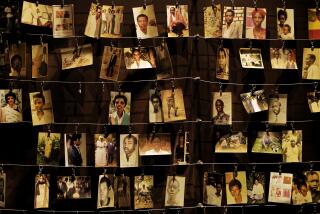Caution: Moral Snares Ahead
- Share via
The GIs arriving in the southern Philippines to offer aid in the fight against the Islamic terrorist group Abu Sayyaf are by no means the first U.S. troops to take up station in places such as Mindanao, Basilan and Jolo. As they do so, Americans would do well to recall when the U.S. last set out to crush Muslim separatists in that exotic clime.
In 1903, having put down an insurrection by Filipino nationalists hoping that the overthrow of Spanish rule might lead to independence, President Theodore Roosevelt moved quickly to complete the pacification of the United States’ new Pacific colony. He ordered his favorite proconsul, Gen. Leonard Wood, to bring to heel separatists inhabiting what U.S. authorities called Moro province, home to 250,000 Filipino Muslims who had long opposed domination by whoever happened to be ruling in Manila. Poorly equipped and organized, the Moros did not constitute much of an opponent in any conventional sense. American soldiers figured to make short work of such a backward foe and bring order and civilization to Moroland.
Events did not unfold as planned. Instead, an ugly, inconclusive guerrilla campaign ensued. By the time it petered out years later, thousands of Muslims and more than a few Americans had died. The U.S. Army stood accused of massacring noncombatants in cold blood. And Moro resistance to outsiders remained stubbornly intact--as it has to the present day.
In Moroland, the U.S. got more than it reckoned for. Primitive conditions, a vast inhospitable jungle and, above all, the Moro warrior’s perverse willingness to die offset the overwhelming U.S. edge in technology and firepower. Assaults on enemy cottas--primitive fortresses--inevitably produced tactical success, along with heavy Moro losses. But they did not yield decisive victory.
As the war dragged on, U.S. inhibitions fell by the wayside. Frustrated by the Moros’ refusal to embrace Western ways, Wood abandoned any pretense of uplifting the natives. Gradually, U.S. forces drifted toward what came to resemble a strategy of extermination. The low point occurred in March 1906 on Jolo at the extinct volcano of Bud Dajo. Several hundred Moros had gathered atop the volcano, spooking U.S. commanders into thinking that an uprising was afoot. To preempt any such plot, several battalions of American regulars surrounded the summit, vigorously shelled it and then assaulted. Virtually the entire Moro encampment was wiped out, about 600 in all. Many of those killed were women and children.
The “battle” of Bud Dajo differed little from any number of previous encounters except in one respect: This time the press got wind of it.
The result was an embarrassing scandal. An unapologetic Wood blamed the Moros: They armed women; they used children as human shields.
“Work of this kind,” he reported privately to Roosevelt, “has its disagreeable side, which is the unavoidable killing of women and children. But it must be done, and disagreeable as it is, there is no avoiding it.”
The disagreeable work that is the American soldier’s lot at the beginning of the 21st century is by no means identical to what it was a hundred years ago. But as the ever-widening circle of U.S. military commitments suggests, it remains the business of empire: establishing order, maintaining stability and enforcing norms of behavior, the logic of which may be more self-evident to ourselves than to others.
Americans today take it for granted that the technology and firepower that have worked elsewhere with seemingly antiseptic effectiveness will prove universally applicable. They also imagine that they can wield their military might with a clear conscience. When the odd stray bomb kills noncombatants, that too is “unavoidable.”
With the war on terror entering the second of what may be many phases, the conditions that U.S. troops will encounter in the once-familiar confines of the old Moro province are likely to test those optimistic assumptions.
History seldom teaches lessons of the sort that apply directly from one era to the next. Yet history may on occasion sound a cautionary note.
Flushed with success at having vanquished the Taliban, the Bush administration may be susceptible to the same failings that befell Roosevelt and Wood--hubris chief among them. We should be wary of expectations that what worked in Afghanistan will translate into easy victory elsewhere.
More important, we should be wary of the moral snares that lie ahead.
*
Andrew J. Bacevich is professor of international relations at Boston University.
More to Read
Sign up for Essential California
The most important California stories and recommendations in your inbox every morning.
You may occasionally receive promotional content from the Los Angeles Times.












